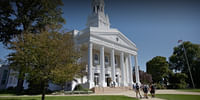The Physics Department is an integral part of that tradition. The contemporary study of the physical universe encompasses systems ranging from the microscopic - atoms, nuclei, and elementary particles, to the very large - planets, stars, and galaxies. A central theme of all branches of physics is the search for unifying principles underlying the diverse phenomena of nature. Wellesley offers a full range of academically demanding courses that constitute a strong physics major and small classes that allow for individualized attention.
A major in physics involves the study of the universal principles underlying phenomena ranging from the behavior of subatomic particles to the structure of the universe.
It also entails the applications of these principles to the phenomena we observe every day and to the technology used to explore the world and address people?s needs. Important components of the major are: modeling, problem-solving, and developing the critical thinking skills necessary to address fundamental questions about Nature. To acquire these skills our majors engage in active inquiry in the classroom and teaching laboratories and in performing research. In addition to preparing students for graduate study in physics or engineering, a major in physics is an excellent basis for a career in other sciences, business, public policy, medicine, law and the arts. Physics majors will also be prepared with fundamental intellectual tools to support their lifelong learning in a rapidly changing world.
Goals for the Major
- The Wellesley physics major is designed to give students an effective and engaging sequence of experiences to prepare them for graduate study or any of the subsequent paths listed above.
- Physics courses for the first three semesters have laboratory components that provide hands-on training in investigating the physical world and exposure to modern equipment and analytical tools.
- There is also a two-term mathematical methods sequence that focuses on the link between mathematics and physics that is central to the modeling process.
- Our core upper-level courses include advanced work in three fields fundamental to the understanding of the many special topics within the discipline as well as an advanced laboratory course that gives students experience in modern experimental techniques.














